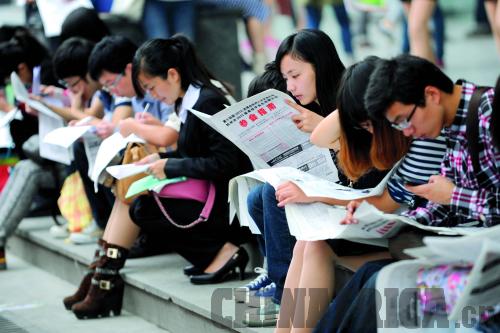|
 |
|
Job seekers struggle in China's employment rat race |
Although Lu Xiaofeng, a 25-year-old master degree candidate, had prepared for the employment rat race, she didn't expect to receive any job offers until the end of May, after the peak season for job-hunting had passed.
"Since last October, I have handed out countless resumes and had no less than 20 interviews, but I only got one offer from a small local private company," Lu, who studies law at Anhui University, told ChinAfrica.
Lu is one of the many frustrated job-hunters in China this year. Due to the rapid expansion of college enrollment over the past 13 years, the number of college graduates in China has quadrupled, making 2013 the hardest job-hunting season in the nation's history. A slowing economy has exacerbated the situation.
Tough times
The number of Chinese university graduates has risen over the past years. China's Ministry of Human Resources and Social Security reports that 6.99 million students will graduate from university this summer, 190,000 more than in 2012, setting a new record since the founding of the People's Republic of China in 1949. The number of students graduating college each year has increased by nearly 1 million in the four years since the number first broke 6 million in 2009.
As the number of graduates has increased, demand for entry level workers is declining. MyCOS Data, a Beijing-based research institute that studies China's higher education and employment, estimates that job vacancies fell by roughly 15 percent in 2013, according to a survey of 500 companies conducted in February of this year.
"In the past, we generally recruited about 1,000 fresh graduates on average every year. However, this year we will employ only 500 new graduates at most," Jiang Min, who works in JAC Motor's Human Resources Department, told ChinAfrica.
The rising number of graduates and declining number of job offers has resulted in a low job contract signing rate, one of the most important indexes of employment. In early May, only 33.6 percent of college students in Beijing, the location of most of China's top universities, had signed job contracts. Further south in Shanghai, the figure was 44.4 percent, down about 2 percentage points from a year ago. And in Guangdong Province, China's industrial powerhouse, only 47 percent had signed job contracts.
Despite this bleak employment situation, graduates majoring in manufacturing as well as electrical and information engineering have had an easier time finding employment, according to MyCOS Data. But students who majored in English, law, computer science and technology, accounting, international economy and trade, and business management are battling to get a job and start their careers.
Economic impact
Besides the rising number of graduates and fierce job competition, tepid economic growth and an industrial structure that is unable to absorb sufficient numbers of new graduates also contributed to this year's high employment pressure. "Employment of college students has been an issue for years. But the slack economic situation has added to the pressure this year," said Xiong Bingqi, Vice President of the 21st Century Education Research Institute.
After the nation's economy grew by double digits over the past decade, China's GDP growth slowed to 7.8 percent in 2012. The Report on the Work of the Government delivered by then Premier Wen Jiabao in March 2013 announced the reduction of the GDP growth target to 7.5 percent. The latest statistics released by the Chinese National Bureau of Statistics showed that the nation's GDP growth slowed to 7.7 percent in the first quarter of 2013, a year-on-year decrease of 0.4 percentage points. Every drop of 1 percentage point in GDP growth means the loss of more than 1 million jobs, according to experts.
|